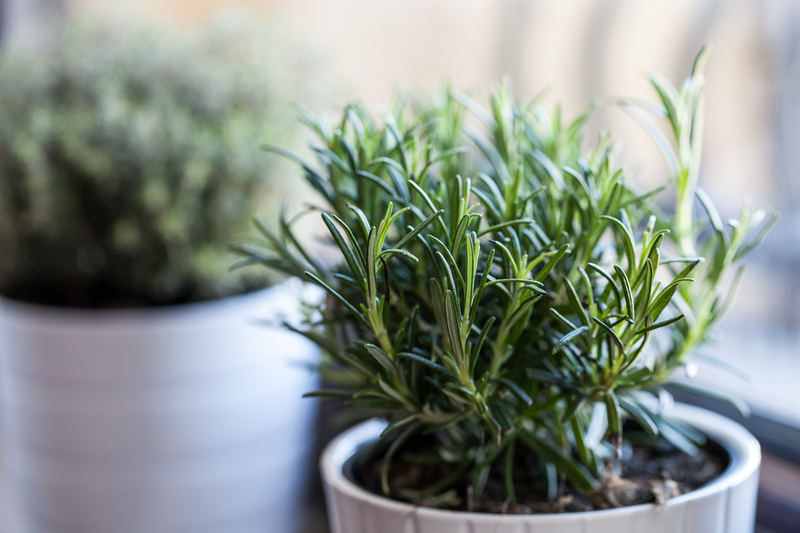Garden Plant Protection Strategies for Harsh Winter Months
Posted on 30/08/2025
Garden Plant Protection Strategies for Harsh Winter Months
Winter can be a challenging time for gardeners. Plummeting temperatures, frost, chilling winds, and snow can take a toll on even the hardiest of plants. Yet, with the right plant protection strategies, it is possible to safeguard your garden and ensure your cherished flora survives until the warmth of spring returns. In this detailed guide, we'll explore effective and proven garden plant protection techniques for harsh winter months, focusing on practical methods and eco-friendly solutions to keep your garden flourishing year-round.

Understanding the Threats to Garden Plants During Winter
Before delving into specific winter plant protection strategies, it's crucial to know the main threats your garden faces when temperatures drop:
- Freezing Temperatures: Cold weather can cause water in plant cells to freeze, resulting in cell damage or death.
- Frost: Frost can cause sudden temperature changes, leading to wilting, blackened leaves, and even plant loss.
- Snow and Ice Accumulation: Heavy snow or layers of ice can break branches, squash delicate plants, and create wounds for diseases to enter.
- Desiccation: Winter winds can dry out plant tissues, especially broadleaf evergreens.
- Animal Damage: Hungry wildlife like deer, rabbits, and rodents can feast on tender bark, twigs, and roots when food is scarce.
Preparation: The Foundation of Effective Winter Plant Protection
A successful winter plant protection plan starts before the cold arrives. Preparation is key! Here are crucial steps to prepare your garden for the brutal conditions ahead:
Choose Winter-Hardy Plants
For long-term success, select plants that are naturally suited to your region's climate. Native and winter-hardy species generally tolerate harsh winter conditions far better than exotic or tender varieties.
Healthy Plants are Resilient Plants
A healthy plant withstands winter stress more effectively. Keep up with fertilizing, watering, and pest management during the growing season so plants enter winter strong. Avoid late-season fertilization, as new soft growth may be vulnerable to frost.
Mulching: A Natural Insulator
Mulching is one of the most reliable garden plant protection strategies. In late autumn:
- Apply 2-4 inches of mulch such as shredded bark, straw, or leaves around the base of plants (but keep it away from the trunk or stem).
- This layer helps regulate soil temperature, retain moisture, and prevent damaging freeze-thaw cycles.
- Organic mulches break down over winter, enriching the soil as they protect your plants.
Physical Barriers: Shields Against the Elements
Row Covers, Cloches & Horticultural Fleece
Lightweight row covers, frost blankets, and garden fleece provide a simple yet effective barrier against frost and cold winds. These products are easy to drape over beds of tender annuals, vegetable patches, or newly planted perennials.
- Secure covers to the ground using pegs or soil to keep out cold drafts.
- Remove during warm spells to prevent overheating and encourage air circulation.
- Reusable and widely available in garden centers and online.
DIY Plant Protection: Cloches and Mini-Greenhouses
Get creative with homemade plant protection for winter:
- Upcycle plastic bottles, glass jars, or even milk jugs to make individual cloches for protecting delicate seedlings.
- Place wire cages around young shrubs or precious perennials, then wrap with burlap for wind and frost protection.
- For larger beds, construct simple hoop tunnels from plastic pipe and heavy-duty plastic sheeting or garden fleece.
Burlap Wraps for Trees and Shrubs
Burlap is a gardener's ally in plant winter protection:
- Wrap burlap loosely around evergreens and vulnerable shrubs to block desiccating winds and prevent sunscald.
- Make a windbreak by stapling burlap to stakes on the windward side of plants.
- Remove as soon as the weather warms in spring to prevent moisture buildup and fungal issues.
Water Management: Addressing Freeze-Thaw Cycles
Proper hydration is vital for garden plant protection in winter months:
- Water Deeply Before Freeze: Give your garden a thorough soaking before the ground freezes--hydrated roots are less likely to suffer freeze damage.
- Avoid Overwatering: Waterlogged soil can cause root rot. Ensure your beds have good drainage.
Once winter sets in, avoid watering unless there's a dry, mild spell and the soil isn't frozen.
Protecting Potted and Container Plants
Pots are at far greater risk from harsh temperatures, as their exposed sides allow soil to freeze quickly. To ensure container plant winter protection:
- Move pots against south or east-facing walls for warmth and shelter.
- Insulate containers by wrapping them in bubble wrap, burlap, or using straw bales around them.
- Group pots together for mutual protection and cover with frost cloths if severe weather looms.
- Consider relocating delicate or borderline-hardy potted plants to a shed, garage, or cold frame.
Specialized Strategies for Different Plant Types
Evergreens
Evergreen trees and shrubs continue to transpire moisture throughout winter, making them prone to windburn and desiccation. Protect them by:
- Applying extra mulch around the base to insulate roots.
- Building winter screens or windbreaks from burlap or temporary fencing materials.
- Spraying with anti-desiccant products (available at garden centers) to slow water loss through leaves.
Roses
Many roses require special harsh winter protection:
- Prune back long canes to prevent wind damage.
- Heap soil or mulch 8-12 inches around the base for insulation.
- Cover the entire bush with burlap or a dedicated rose cone for maximum protection.
Perennials
Most perennials benefit from extra winter care:
- Leave dead stems in place for extra insulation and to provide habitat for beneficial insects.
- Apply a thick mulch blanket and water well before the first freeze.
- Mark locations of dormant perennials with stakes to prevent accidental damage.
Fruit Trees & Tender Varieties
Young or exotic fruit trees are particularly vulnerable to cold damage.
- Wrap trunks with tree wrap or burlap to prevent cracking caused by temperature fluctuations (sunscald).
- Mulch around the root zone but keep it away from the base to discourage rodents.
- Consider building temporary frames covered in plastic sheeting as mini-greenhouses during deep freezes.
Defending Against Wildlife in Winter
During winter, food is scarce for critters. To guard your precious plants:
- Install wire mesh or hardware cloth barriers around trunks and raised beds to keep out gnawing animals.
- Use commercial or homemade repellents on vulnerable plants (reapply after snowfall).
- Collect fallen fruit and seeds, which can attract unwanted visitors.
- Clear thick mulch close to tree trunks to prevent hiding spots for rodents.
Common Mistakes to Avoid When Protecting Garden Plants in Winter
- Using Plastic Directly on Plants: Plastic traps moisture and can "cook" plants on sunny days. Always use breathable materials like horticultural fleece or burlap.
- Forgetting to Remove Covers: Once temperatures rise or the risk of frost has passed, remove protective covers to let air and light reach plants.
- Piling Mulch Against Stems: Keep mulch a few inches away from trunks and stems to prevent rot and rodent damage.
- Neglecting Watering: Roots can dry out during winter, so ensure plants are hydrated before deep freeze sets in.
Spring Recovery: Assessing and Caring for Overwintered Plants
When warmer days return, it's time for a gentle transition. Spring plant care after winter protection is crucial for a healthy garden revival:
- Gradually remove mulch and protective covers to avoid shock.
- Prune away winter-killed stems and wait for new growth before judging plant survival.
- Resume watering and fertilizing as growth resumes but don't rush--soil may still be cold and wet.
- Monitor for signs of disease caused by winter injury and act promptly to remedy issues.

Eco-Friendly Winter Plant Protection Solutions
Gardening sustainably benefits both plants and the planet. For eco-friendly winter protection:
- Use locally sourced organic mulch materials.
- Reuse burlap sacks and old blankets for wrapping.
- Build shelters and barriers from reclaimed or biodegradable materials.
- Encourage wildlife-friendly gardening by leaving seed heads, dry grasses, and leaf litter in select areas.
Conclusion: Ensuring Garden Vitality Through the Coldest Months
Facing winter's challenges requires careful planning, but protecting your garden is well worth the effort. From mulching and wrapping to water management, physical barriers, and specialized care for tender varieties, you have a wealth of options to keep your plants safe. The right garden plant protection strategies for harsh winter months will help your garden not only survive but thrive when spring finally arrives.
Implement these diverse methods--and adjust them as needed for your unique garden--and you'll enjoy a flourishing, resilient landscape for seasons to come.
FAQs: Garden Plant Protection for Winter
- When should I apply mulch for winter protection?
Apply mulch after the first hard frost to avoid creating habitats for overwintering pests. - Are evergreen trees more susceptible to winter damage than deciduous trees?
Yes, because evergreens continue to transpire through winter and can suffer from desiccation and windburn. - What's the best way to protect potted plants in winter?
Move pots to sheltered locations, insulate with wraps, and group together for extra warmth.
Your efforts today will reward you with a vibrant, beautiful garden tomorrow--even after the harshest winter months!
Latest Posts
Affordable Ways to Achieve Low Maintenance Garden Bliss
Innovative Ideas for a Child-Focused Garden Design
Unlocking the Mysteries of Successful Orchid Care
Digging Deeper: Gardening's Role in Climate Action
Become a Plant Whisperer: 9 Essential Gardening Tips for Beginners

